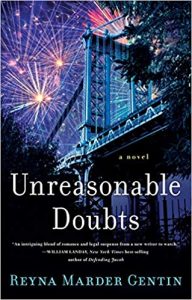Faith in fiction
 Every year around Thanksgiving, well-meaning articles suddenly appear warning folks not to discuss politics or religion at the table if they want to keep the holiday meal friendly. Is the same true when writing fiction? If we want our stories to have wide appeal, perhaps we’re better off staying away from these contentious subjects as well.
Every year around Thanksgiving, well-meaning articles suddenly appear warning folks not to discuss politics or religion at the table if they want to keep the holiday meal friendly. Is the same true when writing fiction? If we want our stories to have wide appeal, perhaps we’re better off staying away from these contentious subjects as well.
Obviously, I’m not talking about a political thriller set in the White House, or a novel where the main character is a nun. But in fiction that is neither overtly political nor religious in its themes or plot, what lines should you draw in including these subjects?
I have no problem keeping a safe distance from politics in my fiction. Not only do I think that taking sides can be unduly divisive and distract from your story, it tends to pin your fiction to a certain time and place that may limit the reach of your work. The religion question hits closer to home. Where your fiction is otherwise non-religious, can you weave in ritual and spirituality in a way that’s meaningful and informative without being overbearing or exclusionary?
When I write fiction, be it a short story, a novel, or other projects in the works, my religion tends to seep in, sometimes unexpectedly. So far, my forays have been well received, as far as I can tell. I’d like to share my thoughts on how to incorporate religion into your writing if you also feel that pull.
Don’t be afraid.
While you certainly may want to tread lightly in bringing religion into your fiction, if you are too squeamish about it, your reader will feel your hesitancy and you’ll defeat whatever purpose you were trying to achieve. Readers are interested in learning about the beliefs and rituals of their own faiths as well as religions with which they are totally unfamiliar. Teach them. There’s no need to be didactic – but if a baby is baptized in your story or a family attends a bar mitzvah, don’t be scared to describe what goes on at that event and the emotions and reactions of the characters during those moments. If your protagonist has doubts about her faith or, conversely, has an epiphany, go there. These glimpses lend depth to your story in a way that will speak to many readers.
Write from the inside, or really do your research.
When writing about something as intensely personal as religion, you’ve got to get it right. There’s little more disturbing than reading a story that references a religious practice or tenet where the author says something that is blatantly inaccurate, either because she’s not sufficiently familiar with the doctrine from her own upbringing, or because she hasn’t taken the time to find out the specifics of another’s faith. In either situation, a misrepresentation can be off-putting at best, offensive at worst. Whatever your own feelings about religion, it’s something that many readers take seriously. So dig in, but make sure to be respectful and substantively correct.
Make it about the characters.
If someone picks up your short story or your novel, she isn’t looking to read a treatise on Catholicism or Buddhism. A reader is looking to relate to your characters – and that can include the religious affiliations of your characters if it adds to your audience’s understanding of the story. In my novel, Unreasonable Doubts, I broached this in two ways, making sure always to keep the focus on the characters.
Although my protagonist, Liana Cohen, has a cultural connection to her Judaism, she does not practice much – she doesn’t keep the kosher dietary laws or observe the Sabbath. But part of her personality is that she’s open to exploring what the teachings of her religion can offer as she searches for more meaning in her life, which allowed me to get some Jewish wisdom in as part of her journey.
Liana befriends a rabbi, with whom she interacts at critical moments in the narrative. Again, the religious elements in the novel come in through the character of the rabbi, who is himself an eclectic and multi-dimensional person, and who helps Liana figure out her priorities in love and work through a Jewish lens. Remember, you’re not aiming for Sunday school here – this is religion in aid of fiction, not the other way around.
Lean positive, and accept that this aspect of your story won’t appeal to everyone.
I would never presume to tell anyone how to feel about the religion they were born into or any other belief system, and I have as much respect for an atheist as I do for an ardent adherent to her faith. But when you are writing fiction, unless it is critical to the story to be negative or rejectionist, why not try to stay basically positive? Perhaps your character has a truly terrible Christmas at her mother’s house.
If there’s a way to explore that and stay true to your story without trashing the whole enterprise of Christmas, that would be my advice. There are always going to be people who read your story and dislike that you have included religious elements. But don’t give your readers a reason to reject your fiction because you have gratuitously hated on their faith or someone else’s. I’m not encouraging some sort of greeting card approach to religion – just remember that, imo, readers want to feel good about you and your approach to this very important subject.
—
REYNA MARDER GENTIN grew up in Great Neck, New York. She attended college and law school at Yale. For many years, she practiced as an appellate attorney representing criminal defendants who could not afford private counsel. Reyna studies at the Writing Institute at Sarah Lawrence College, and her fiction and personal essays have been published in The Westchester Review and online. She lives with her family in Scarsdale, New York.
To learn more, please visit reynamardergentin.com
Facebook reynamardergentin
Follow her on Twitter @reynagentin
UNREASONABLE DOUBTS, Reyna Marder Gentin
 Jaded New York City Public Defender Liana Cohen would give anything to have one client in whom she can believe. Dozens of hardened criminals and repeat offenders have chipped away at her faith in both herself and the system. Her boyfriend Jakob’s high-powered law firm colleagues see her do-gooder job as a joke, which only adds to the increasing strain in their relationship.
Jaded New York City Public Defender Liana Cohen would give anything to have one client in whom she can believe. Dozens of hardened criminals and repeat offenders have chipped away at her faith in both herself and the system. Her boyfriend Jakob’s high-powered law firm colleagues see her do-gooder job as a joke, which only adds to the increasing strain in their relationship.
Enter imprisoned felon Danny Shea, whose unforgivable crime would raise a moral conflict in an attorney at the height of her idealism―and that hasn’t been Liana in quite a while. But Danny’s astonishing blend of good looks, intelligence, and vulnerability intrigues Liana. Could he be the client she’s been longing for―the wrongly accused in need of a second chance? Is he innocent? As their attorney-client relationship transforms into something less than arm’s length, Liana is forced to confront fundamental questions of truth, faith, and love―and to decide who she wants to be.
“Fans of Allison Leotta and Lisa Scottoline will appreciate the domestic and romantic elements as well as the legal intrigue.”
―Booklist
“…intelligently written…. There is something in this story for everyone, and if you are like I was, the ending is going to be worth the wait.”
―Reader Views
BUY THE BOOK HERE
Category: Contemporary Women Writers, How To and Tips

























Hi, Reyna,
Thanks so much for this vital information. I’ve got a novel and novella and WIP with faith traditions and religious themes in them, and I have tried to work to make it not pedantic or preachy, but more the character’s way of life. I appreciate your comments on how to go about weaving religion into the life of the character and such. This helps me so much. Thank you.
Excellent post – and about a topic I don’t see addressed all that often. Your points are well taken. Another way to add depth and nuance to characters as well as get readers involved in thinking beyond the page.